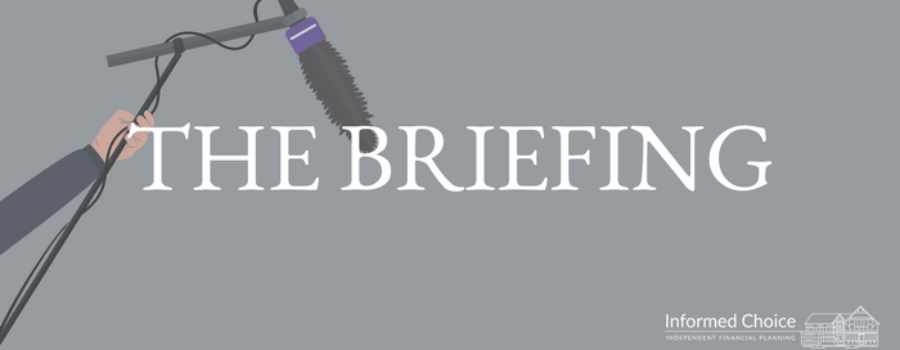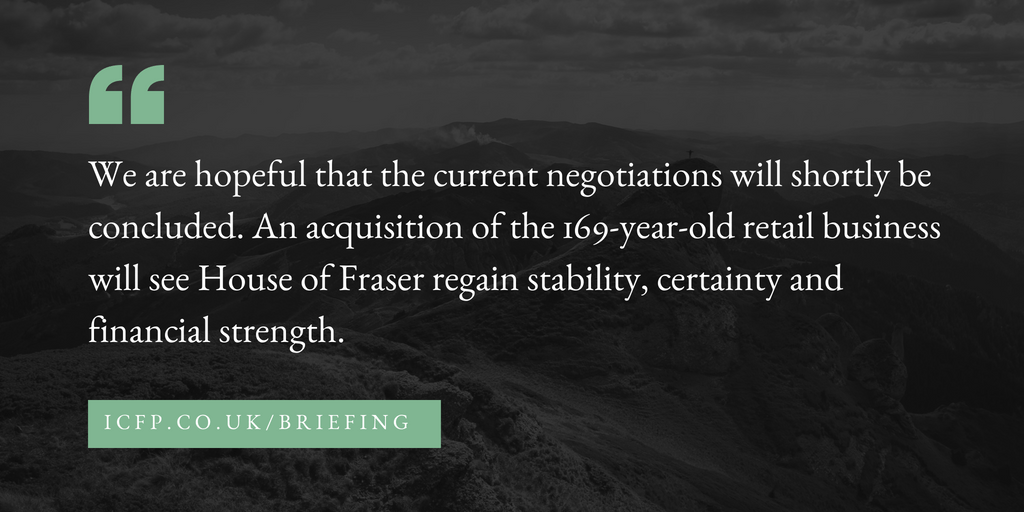In this edition of The Briefing from Informed Choice on Friday 10th August 2018 – House of Fraser in trouble, 20 more years of low interest rates, Brexit contingency plans, defrauded by credit card, and falling arrears & possessions.
Subscribe to The Briefing by email
Enable the Amazon Alexa Flash Briefing Skill
House of Fraser in trouble
House of Fraser is appointing administrators, after talks with investors failed to result in a rescue package for the trouble department store chain. Its 59 stores remain open on Friday, including the 31 already designated for closure. House of Fraser has been trading for 169 years and employs 17,500 staff, including 11,500 staff working in its concessions. Administrators Ernst & Young confirmed the business would keep trading for now, as they attempted a sale. There is press speculation that a deal to buy the business out of administration could be concluded shortly.
House of Fraser chief executive Alex Williamson said:
We are hopeful that the current negotiations will shortly be concluded. An acquisition of the 169-year-old retail business will see House of Fraser regain stability, certainty and financial strength.
In the two weeks since the Cenbest and C.banner transaction ceased, the directors have brought forward a number of potential buyers and the group’s financial advisers have run a comprehensive M&A process to identify and then develop other third-party interest that has culminated in the senior secured creditors leading negotiations with parties at a critical pace.
20 more years of low interest rates
Low interest rates could remain in the UK for another 20 years, according to a Bank of England policymaker. Ian McCafferty, who is leaving the Bank’s Monetary Policy Committee at the end of this month, explained structural changes to the global economy would result in UK interest rates being ‘significantly’ below the 5% average experienced in the decade leading up to the financial crisis. He said weak productivity and a build-up of savings by the post-war baby boomer generation – both factors leading to a decline in global interest rates since the 1980s – would eventually go into reverse.
McCafferty said:
It is too much to say never, that we won’t ever go back. But there is a 20-year horizon under which there will be factors keeping it low.
Brexit contingency plans
HM Treasury has confirmed it will start putting contingency plans in place for financial services regulation in the event of a no-deal Brexit. They told financial services firms to continue planning for a two year transition phase from next March, but it was also preparing in case that didn’t happen. Under a no-deal scenario, Britain would convert EU laws and regulations into British laws, using a process called ‘onshoring’. It is hoped this would result in a smooth exit for the financial services sector in the UK, which represents around 12% of the British economy.
In a document outlining its approach to post-Brexit financial services regulation, the Treasury said:
The government will ensure a workable legal regime is in operation whatever the outcome of negotiations.
Defrauded by credit card
Nearly 1 in 10 UK adults have been defrauded via their debit or credit card in the last year, equating to 4.7 million people across the country. This is according to a poll of 2,000 UK adults commissioned by Compare the Market, which found that nearly 5 million people have had their credit card, debit card or bank account cancelled or replaced as a result of attempted fraud in the twelve months. The most common form that this fraud takes has been through online payments, with over a quarter experiencing a hack of either card or account. Alarmingly, 27% don’t know or can’t remember how they were hacked.
Shakila Hashmi, Head of Money at Compare the Market said:
In the last two years, we have seen the average amount stolen from accounts soar from £475 in 2016 to £833 in 2018. This is an extremely worrying trend and suggests a significant rise in aggressive bank and credit card fraud. It is also worrying that so few people decide to take action by moving provider after an attack takes place. Whilst we do all have a responsibility to try keep our banking and card details secure, providers have a duty of care to ensure that their customers are as protected as possible. It is also vital that they jump on suspicious activity, something that our research suggests does not happen enough – according to our research, 44% of people who had been hacked had to alert their credit card provider or bank about the incident.
However, it is reassuring to see that some behaviour is changing as a result of fraud. People are more likely to check their bank and credit card accounts regularly, and to have different passwords and pins for their various accounts, and most now won’t give out their bank details over the phone. All of these measures need to be ramped up in order for people to lessen the chance of being hacked. However, if a provider has not spotted suspicious activity or has not dealt with a fraud to the best of their ability then it is vital that people vote with their feet and move to suppliers with a better client service rating.
Falling arrears & possessions
UK Finance’s latest Mortgage Arrears and Possessions Update has shown that there were 76,740 homeowner mortgages in arrears of 2.5% or more of the outstanding balance in the second quarter of 2018. This is 8% fewer than in the same quarter of the previous year. Within the total, there were 23,190 homeowner mortgages with arrears representing 10% or more of the outstanding balance. This was 4% fewer than in the same quarter of the previous year. 1,060 homeowner mortgaged properties were taken into possession in the second quarter of 2018, 5% fewer than in the same quarter of the previous year.
Jackie Bennett, Director of Mortgages at UK Finance said:
Arrears and possessions are at an all-time historic low since we first started collecting this data over 24 years ago. While this is positive, last week’s base rate rise coupled with the disappointing uptake of the Support for Mortgage Interest (SMI) loan could see arrears creeping up in the coming months.
With well over 90 per cent of new loans taken out at fixed rates, most recent borrowers will see no immediate impact from the Bank rate increase. However, anyone with concerns about managing their mortgage should contact their lender to discuss the advice and support available. Repossession is always a last resort.
Informed Choice provides a regular personal finance and investment news summary, with an updated Flash Briefing for your Alexa enabled device. Search for The Briefing from Informed Choice in your Amazon Alexa app or visit https://www.amazon.co.uk/Informed-Choice-Radio/dp/B074DZZ1MF/ to enable this Flash Briefing.


